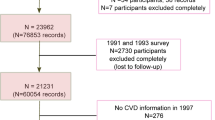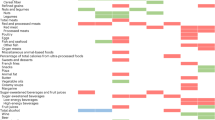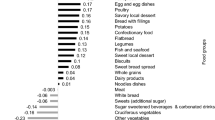Abstract
Background/Objectives:
Recent long-term prospective cohort studies found inverse associations between chocolate consumption and the risk of type 2 diabetes, but provided conflicting evidence on the nature of the association among women. To assess this association in a large cohort of American women.
Subjects/Methods:
Multivariable Cox regression was used with the data from 92 678 postmenopausal women in the prospective Women’s Health Initiative study. Chocolate intake was assessed by food frequency questionnaire. Incidence of type 2 diabetes was determined by self-report of the first treatment with oral medication or insulin.
Results:
Among women free of diabetes at baseline, there were 10 804 cases, representing an incidence rate of 11.7% during 13.1 years and 1 164 498 person-years of follow-up. There was no significant linear association between long-term chocolate intake and type 2 diabetes risk, but there was significantly reduced risk at moderate levels of intake. Compared to women who ate 1 oz. of chocolate <1 time per month, those who ate this amount 1–<1.5 times per month, 1.5–<3.5 times per month, 3.5 times per month to <3 times per week and ⩾3 times per week had hazard ratios of 0.97 (95% confidence interval: 0.92, 1.04), 0.92 (0.87, 0.98), 0.93 (0.88, 0.98) and 0.98 (0.92, 1.04) (P for linear trend=0.79). There was only evidence of such inverse associations for women with below-median physical activity (P for interaction <0.0001) and those with age<65 years (P=0.01).
Conclusions:
We only found an inverse association between chocolate consumption and type 2 diabetes at moderate levels of consumption in two subgroups of postmenopausal women in the Women’s Health initiative cohort.
This is a preview of subscription content, access via your institution
Access options
Subscribe to this journal
Receive 12 print issues and online access
$259.00 per year
only $21.58 per issue
Buy this article
- Purchase on Springer Link
- Instant access to full article PDF
Prices may be subject to local taxes which are calculated during checkout

Similar content being viewed by others
References
Gregg EW, Zhuo X, Cheng YJ, Albright AL, Narayan KM, Thompson TJ . Trends in lifetime risk and years of life lost due to diabetes in the USA, 1985-2011: a modelling study. Lancet Diabetes Endocrinol 2014; 2: 867–874.
Seaquist ER . Addressing the burden of diabetes. JAMA 2014; 311: 2267–2268.
Matsumoto C, Petrone AB, Sesso HD, Gaziano JM, Djousse L . Chocolate consumption and risk of diabetes mellitus in the Physicians’ Health Study. Am J Clin Nutr 2015; 101: 362–367.
Oba S, Nagata C, Nakamura K, Fujii K, Kawachi T, Takatsuka N et al. Consumption of coffee, green tea, oolong tea, black tea, chocolate snacks and the caffeine content in relation to risk of diabetes in Japanese men and women. Br J Nutr 2010; 103: 453–459.
Greenberg J . Chocolate intake and diabetes risk. Clin Nutr 2015; 34: 129–33.
WHI Study Group. Design of the Women’s Health Initiative clinical trial and observational study. The Women’s Health Initiative Study Group. Control Clin Trials 1998; 19: 61–109.
Hu FB, Stampfer MJ, Rimm E, Ascherio A, Rosner BA, Spiegelman D et al. Dietary fat and coronary heart disease: a comparison of approaches for adjusting for total energy intake and modeling repeated dietary measurements. Am J Epidemiol 1999; 149: 531–540.
Chiuve SE, Fung TT, Rimm EB, Hu FB, McCullough ML, Wang M et al. Alternative dietary indices both strongly predict risk of chronic disease. J Nutr 2012; 142: 1009–1018.
Hays RD, Sherbourne CD, Mazel RM . The RAND 36-Item Health Survey 1.0. Health Econ 1993; 2: 217–227.
Tuunainen A, Langer RD, Klauber MR, Kripke DF . Short version of the CES-D (Burnam screen) for depression in reference to the structured psychiatric interview. Psychiatry Res 2001; 103: 261–270.
(WHI) Women's Health Initiative 2013. Women's Health Initiative (WWW document)http://www.whi.org.
Margolis KL, Qi Lihong, Brzyski R, Bonds DE, Howard BV, Kempainen S et al. Women Health Initiative Investigators. validity of diabetes self-reports in the Women’s Health Initiative: comparison with medication inventories and fasting glucose measurements. Clin Trials 2008; 5: 240–247.
Jackson JM, DeFor TA, Crain AL, Kerby TJ, Strayer LS, Lewis CE et al. Validity of diabetes self-reports in the Women’s Health Initiative. J Clin Epidemiol 2013; 66: 349–350.
Cox DR . Regression models and life-tables. J Royal Stat Soc Series B-Statistical Methodology 1972; 34: 187–220.
von Elm E, Altman DG, Egger M, Pocock SJ, Gotzsche PC, Vandenbroucke JP . The Strengthening the Reporting of Observational Studies in Epidemiology (STROBE) Statement: guidelines for reporting observational studies. Ann Intern Med 2007; 147: 573–577. PMID: 17938396.
Langer RD, White E, Lewis CE, Kotchen JM, Hendrix SL, Trevisan M . The Women’s Health Initiative Observational Study: baseline characteristics of participants and reliability of baseline measures. Ann Epidemiol 2003; 13: S107–S121.
Margolis KL, Wei F, de Boer IH, Howard BV, Liu S, Manson JE et al. Women’s Health Initiative Investigators. Women’s Health Initiative Investigators. A diet high in low-fat dairy products lowers diabetes risk in postmenopausal women. J Nutr 2011; 141: 1969–1974.
Patterson RE, Kristal AR, Tinker LF, Carter RA, Bolton MP, Agurs-Collins T . Measurement characteristics of the Women's Health Initiative food frequency questionnaire. Ann Epidemiol 1999; 9: 178–187.
Knuiman MW, Divitini ML, Buzas JS, Fitzgerald PE . Adjustments for regression dilution in epidemiological regression analysis. Ann Epidemiol 1998; 8: 56–63.
Spearman C . The proof and measurement of association between two things. Am J Psychol 1904; 15: 72–101.
Steinberg FM, Bearden MM, Keen CL . Cocoa and chocolate flavonoids: implications for cardiovascular health. J Am Diet Assoc 2003; 103: 215–223.
Katz DL, Doughty K, Ali A . Cocoa and chocolate in human health and disease. Antioxid Redox Signal 2011; 15: 2779–2811.
Lin X, Zhang I, Li A, Manson JE, Sesso HD, Wang L et al. Cocoa Flavanol Intake and Biomarkers for Cardiometabolic Health: A Systematic Review and Meta-Analysis of Randomized Controlled Trials. J Nutr. 2016; 146: 2325–2333.
Acknowledgements
We thank the WHI Investigators (see Online Supplement) for their efforts in the collection of the WHI data.
Author contributions
JG, JM, LT, MN, LG and MV conceived the work that led to the submission. JM, LT, MN, LG and MV acquired the data. JG performed the statistical analysis. JG, JM, LT and MN played an important role in interpreting results. JG drafted the manuscript. JG, JM, LT, MN, LG, MV and LP contributed to the revision of the manuscript. JG had full access to all the data in the study and takes responsibility for the integrity of the data and the accuracy of the data analysis. All authors approved the final version.
Author information
Authors and Affiliations
Corresponding author
Ethics declarations
Competing interests
JM and colleagues at Brigham and Women’s Hospital, Harvard Medical School are recipients of funding from Mars Symbioscience for an investigator-initiated randomized trial of cocoa flavanols and cardiovascular disease. JG is the recipient of funding from the City University of New York Research Award Program to conduct a pilot randomized trial of cocoa compounds and appetite. LP has served on Scientific Advisory Boards for Boehringer Ingelheim and Janssen within the past several years, and has or had research support from Merck, Amylin, Eli Lilly, Novo Nordisk, Sanofi, PhaseBio, Roche, and the Cystic Fibrosis Foundation. In the past, he was a speaker for Novartis and Merck. He is also a co-founder of a company, Diasyst LLC, which aims to develop and commercialize diabetes management software programs. These activities involve diabetes, but have nothing to do with this manuscript. The remaining authors declare no conflict of interest.
Additional information
Supplementary Information accompanies this paper on European Journal of Clinical Nutrition website
Supplementary information
Rights and permissions
About this article
Cite this article
Greenberg, J., Manson, J., Tinker, L. et al. Chocolate intake and diabetes risk in postmenopausal American women. Eur J Clin Nutr 71, 1088–1093 (2017). https://doi.org/10.1038/ejcn.2017.36
Received:
Revised:
Accepted:
Published:
Issue Date:
DOI: https://doi.org/10.1038/ejcn.2017.36
This article is cited by
-
Chocolate and risk of chronic disease: a systematic review and dose-response meta-analysis
European Journal of Nutrition (2020)



